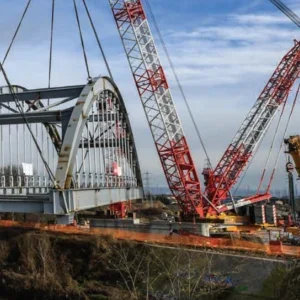National Crane Training, a subsidiary of Occupational Safety Training Systems, provides NCCCO-related services for crane operators across the USA. Recently, the company received a request for training from slightly further afield.
AC FIRST is a joint venture between AECOM, a technical and management support services provider, and CACI, a professional services supplier with a focus on military customers. It was set up to provide tactical vehicle and equipment maintenance, facilities management and maintenance, supply and inventory management, and transportation services under the US Army’s Field and Installation Readiness Support Team contract vehicle.
As part of the order, a team at Bagram Airfield receives military vehicles and transports them across Afghanistan. To do this, they use a range of cranes. Jason Welch, an accredited overhead and construction crane instructor with National Crane Training, explains, “The military equipment comes in on semis.
AC FIRST unload it, get it ready, and send it where it is needed. Some of the vehicles weigh up to 120,000lb (60t), so that’s where they need to use cranes.”
Welch explains that AC FIRST employs crane operators from all over the USA, from a range of backgrounds. The military wanted them to be properly trained and NCCCO certified. One of the trainees found National Crane Training online, and contacted them about bringing an instructor / practical examiner out to Bagram. National Crane Training had worked with AC FIRST joint venture partner AECOM on another project, but there was no contact between the two customers.
Welch flew out to Afghanistan on August 15, arriving at Bagram on August 17. Training in Afghanistan was a bit of a change from his normal routine. “In Vegas, you don’t normally get shot at,” he says. “You fly into Kabul’s commercial airport, then it’s a 20mi drive down ‘Taliban Highway’. About 19mi of that is off-road, avoiding holes blown in the road.
“The first night there, the base got bombed pretty good. You’d sit there; see the Taliban send two or three mortar rounds in, before the army responded. On the third night, we sat eating popcorn, watching the rockets go over the base. There’s not much to do on the base, so you don’t mind working 12 hour days and spending your evening sitting out watching the rockets.”
The project took nine days. “They had very limited experience,” Welch says. The first part of the program was an NCCCO written exam preparatory course, taking place in the classroom. Over four and a half days, Welch and the AC FIRST trainees covered Domain details and calculating load charts, understanding crane regulations, working around power lines, and rigging.
After the class work, Welch worked with the team on crane operations, teaching them how to catch a load and how to read radiuses.
The written part of the exam was conducted through the US military’s college-equivalence testing program, DANTES. Gregg Bullock, business development manager at National Crane Training, explains, “The NCCCO uses DANTES for non-traditional education support. All military bases have a DANTES program.” Welch conducted the practical exams at Bagram, using test equipment AC FIRST had built at the base.
Bullock says, “Jason did well, the candidates got 100% on the practical, 98% on the written. One guy just missed the specialty part of the exam.”
The trainees agree. One of them, AC FIRST theatre RPAT (redistribution property accountability team) manager Don Garst, said, “Jason Welch was the best Instructor that I have had in 29 years of military service or as a contractor. He combined actual practical knowledge with the information from the study guides, which enhanced the whole learning experience. Since the class, we have put what we learned into action on actual missions. Jason’s knowledge on cranes in general was a tremendous learning tool that he used first hand in class. Jason had to show off operating a crane that he had never been on: He maneuvered the practical test course in 14.8 seconds.”






